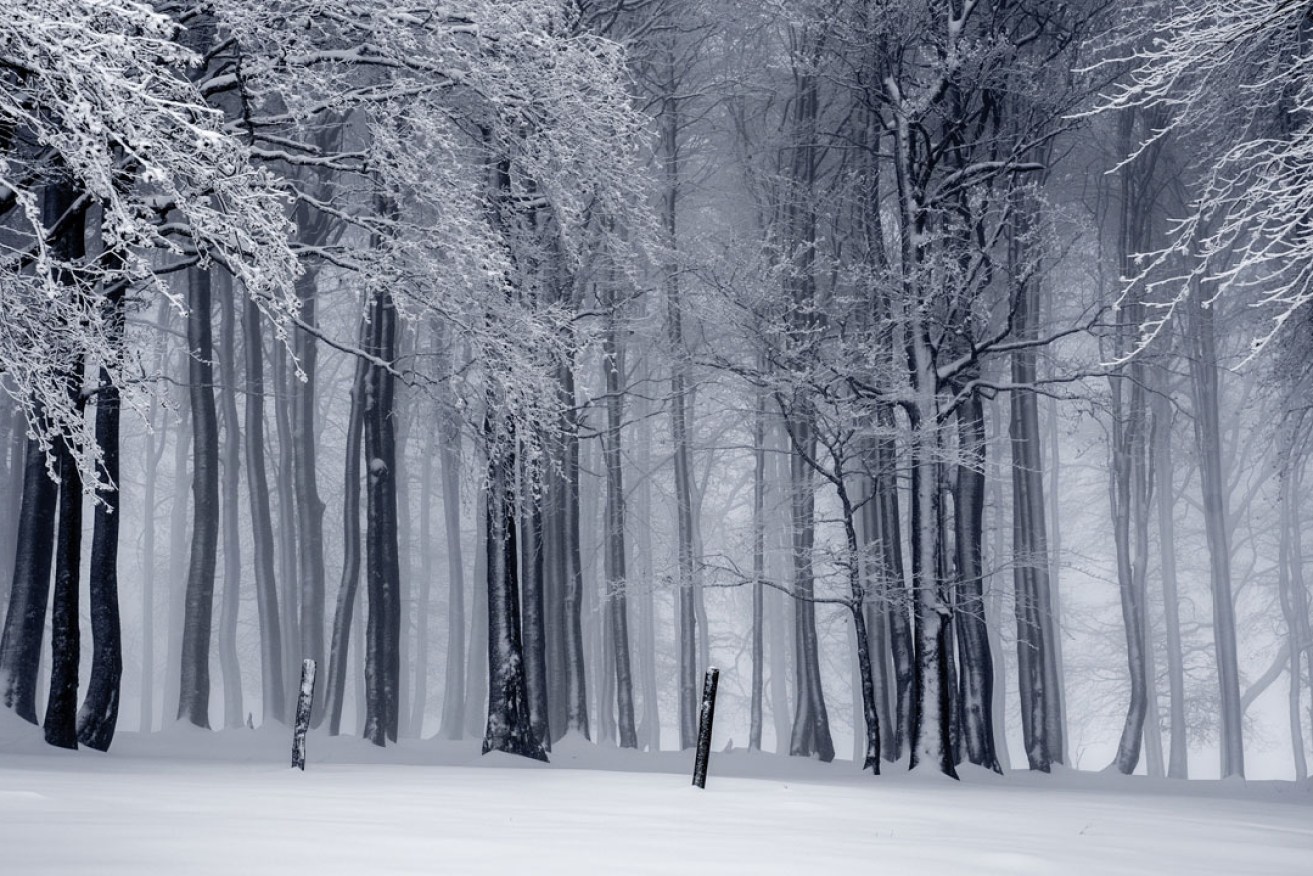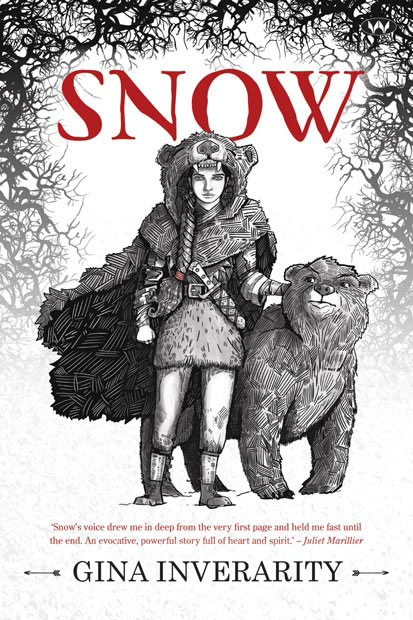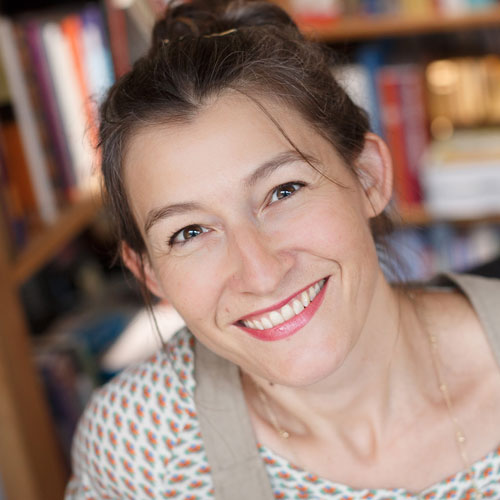Book extract: Snow
Gina Inverarity’s dystopian vision of a drastically altered post-global future in her new young-adult novel Snow has been given added resonance by the COVID-19 crisis.

Described as a dark and lyrical retelling of Snow White, Snow was originally scheduled for publication next month, but publisher Wakefield Press decided to release it early in Australia due to its timeliness.
It is set in a post-climate-change “world gone wild”, where the economy has collapsed, the global has become local, and most people face a daily struggle for survival.
The title character is a young girl who is kept locked in a cell by her stepmother until being released by a hunter who takes her into the forest with orders to cut out her heart. Snow makes him a promise she isn’t sure she can keep … and then she runs
 Inverarity, who is originally from the Adelaide Hills and now lives in Wellington, New Zealand, says that when she wrote the novel, her imagined world seemed “improbable if not impossible”.
Inverarity, who is originally from the Adelaide Hills and now lives in Wellington, New Zealand, says that when she wrote the novel, her imagined world seemed “improbable if not impossible”.
“But all of a sudden, virtually overnight, casual air travel has ceased and island nations are once again truly islands.”
She says that in Snow, the central characters discover that the cost of selfishness is more than they can afford, especially in a crisis.
“While the cost of COVID-19 has been unimaginably high in actual lives lost, what we have been reminded of is that a crisis is a chance for transformation,” she says. “Not just a personal transformation, but perhaps also a global one.”
The following extract is from the first chapter of Snow.
∗∗∗∗
The story of my birth is one I heard told. Even though I were there, without my own memory to call on I have to rely on the telling of others.
When I came into the world I brought a deep, soft quiet with me. For that is how the world is when it’s covered in snow. Quiet. Like all the natural noises of people and creatures is muffled and smothered. The way the story goes is I arrived on a black night as cold as the frozen wastes to the south and, not long after, my mother fell ill with a burning fever, leaving her dead within days. So I was raised on the milk of whatever beast were available, there being no other nursing mothers in the chateau just then. As it were told to me, I drank from the teats of sheep and goats and even once a horse. I grew small and slow but I grew. With my mother gone and my father in a fog of grief, I kept to the kitchen and the yards where I were shown ways by whoever was about.
And all the while the seasons turned fierce and lengthened.
I remember riding my pony through the snowy forest near the chateau with my father. It wasn’t always that we rode horses. There used to be vehicles and engines but they don’t run on grass like horses can. And when the cold fell around here, in other parts there were storms and floods and fires and worse, and then there was no more fuel for vehicles and we went back to the old ways. Lucky for us, horses held no grudge against people for being turned out and overlooked those years when we liked our metal machines more, and they took bits in their mouths and saddles on their backs and returned to work for us like they had for centuries afore.
We were mushrooming that day, some still to be found where the branches grow so thick overhead the snow hadn’t yet frozen the ground. I were up on my pony I named Gray, her harness painted with flowers. She followed the lead of my father’s big bay, the fall of their feet muffled by the forest floor. I wish I knew then to drink in the warmer air and swallow the whole sky. Because you cannot put those things by for leaner times like you can a sack of potatoes. There were mushrooms plenty though and we picked a bundle.
‘Don’t pick those that show colour,’ my father told me, ‘for they are likely to make you sick.’
It were a shame, I thought, because the ones with colour were the pretty ones. Red caps with white spots, and bright orange bulges growing on the trunks of trees. But I were only allowed to touch the plain brown and white ones. Some were cooked for dinner and the rest were dried on racks, stalks withering and caps shrivelling slowly.
‘Good for flavouren soups and stews,’ Cook told me. She puffed them up with boiled water and it was like they were fresh-picked once again.
Cook’s kitchen were set at the back of the main building opening onto the big yard. It were a long room with a table set in the middle. At one end sat a big iron stove heated with a fire that burned day and night. Cook were old enough to remember electric kettles and grills and pans and it were one of her favourite things to groan about the loss of them. Being born into this way of living, electrics were just stories to me. And I loved that iron stove. In my mind it sat like a tired old dragon, belching smoke crossly if it weren’t fed the right fuel at the right time, or sleeping contented when it had a good steady heat burning in its belly.
When my father were alive and there were still vegetables being grown and animals supplying milk and cheese and meat, Cook’s kitchen were full of smells and wonders of edible creation. Stewed fruits and puddings and roasts and cheeses and cakes covered the table and there were always a bustle going on. Cook shouted orders and a couple of girls and a boy or two rushed to her bidding. There were a sink set out on the porch where a boy spent his days bent over washing the piles of dirty pans and plates that never ceased their coming. The kitchen were also safe from my stepmother, who never went there. And everyone living in the chateau passed through at one time or another, so it were the best place to sit quiet and hear some news.
When I were a baby I played under the great table. I were shooed away there when I got under Cook’s feet. And when I was older, after my father died, it was a comfort to sneak in under there. I’d made myself a cosy spot one day when some strangers entered the kitchen, a mother and her children, looking for work. They’d come up from the lowlands, near the city, moving away from trouble there. The woman were vague on what exactly the upset had been.
Her husband weren’t around, she said shortly. ‘Gone from us,’ were her answer to Cook’s enquiry.
‘Well,’ Cook said, ‘there int much work except what we do to survive another season. Everyone has to do something. What are your skills?’
‘I’m a weaver by trade,’ the woman replied. ‘And my daughters all learning from me. If we have wool and flax we can make anything you need. And I see maybe you are. In need, that is.’
I heard a tired sigh come from Cook at her worn-out old towels and tablecloths being noticed by a stranger.
‘I need an extra girl in the kitchen, if one of your daughters wants to learn,’ she said. ‘And even though all our cloths are worn out, there int anything but pride sayen we replace them afore they fall apart.’
‘My boy can hunt,’ the woman said, seeing now that as much as her skills were valued in the city, they might not be enough to save her up on the mountain. ‘He learned from his father.’
From where I sat, not wanting to draw attention to my eavesdropping, I could only see a boy’s legs stuck into boots too big for him, wearing trousers that looked to have been woven by his mother.
Cook were silent, considering. ‘If you can squeeze in with another family and get along together without me hearing about it, you can stay. Have your samples ready and there’s a chance Rain will like your work.’ And, more to herself than anyone else, she said, ‘Then you may wish you’d found another door to knock on.’
That all happened before I were locked away. I have passed three years now in a cold dark cell, plus nine afore that under the sky when my father lived still. So I have twelve years behind me and many more to live if I can escape. If I cannot leave my years are numbered. I’m not allowed a fire and the only way I’m not dead is the wall I share with my stepmother is well heated from the other side. Her fire burns night and day. If it even falls low she screams for it to be stoked back to glowing hot again. But though I follow the weak light as it travels across the floor of my room, exposing my cold skin to it, I know I can’t survive shut away forever. Already I’m small for my age. One of the girls who brings me meals was a child the same as me, and while she grew over the years, I have not keep match with her. The thickest part of me is my black hair, braided like a rope.
There’s a deep quiet in the chateau outside my high window. Another heavy snowfall in the long night and all sounds are muffled. The roof beams were groaning and creaking under the weight of it, until the men climbed up and pushed the snowfall off into the courtyards below. At any time I expected one of them to come crashing through and land in my room with me, the roof being in none too good a repair after many years of my stepmother’s neglect.
After passing the dim hours of daylight in much the way I pass all others, by doing my wondering and singing softly to myself for company, I fell asleep when it were dark outside and in, there being no way to occupy myself when I can’t see for blackness. I woke to the sound of riders coming in. I could hear the horses snorting, tryen to clear icicles from their nostrils. Apart from the clink of metal shoes on paving, I could not hear what was said by those who went out to greet them, nor see anything but the glow of torches against the stone walls of the yard. After some time I heard footsteps in the hall outside my room, heavy ones like those of men in riding boots.
I pressed my ear to the wall that I shared with my stepmother but could hear nothing but murmurs. It seemed the men were asken my stepmother questions, for they did most of the speaking. Then there were pauses before my stepmother’s voice came back with short responses. It were a brief meeting and I were none the wiser as to the reason for their visit when the same boot steps passed by in the hallway again. The horses had been led to the stables, so the riders must have begged a bed for the rest of the long night.
There were no point lying awake looking at the blackness in front of my eyes. Best to close them and look at the dreams and memories that appeared like magic behind.
When the girl brought my bowl the next day she was in and out through the door like she couldn’t move fast enough. And when the lock clicked after her I found something she’d left.
A knife.
And not one for spreading butter, but a sharp one for slitting throats, with a bone handle. I only let myself have a few seconds to admire it before I slipped it into my belt and pulled my ragged jumper low. Then I ate my food and curled up. It were bone-chilling cold, and there being nothing to do to pass the day but huddle close to the wall, I did so, keeping my blankets wrapped tight around me. There was something afoot and I wanted to be ready to face it so I tried to stay awake but my full belly had its own opinion and I must have fallen asleep.
I awoke to the sound of my door swinging open. As I sat up on my cot, a spirit lantern dazzled me, and I realised I’d slept through the short day and it was now night.
‘Get up and come with me.’
Shielding my eyes to adjust them as quick as I could, I saw a man in the doorway. He wore leathers and boots, and the fur wrapped around his shoulders looked like dog. A firearm hung across his back so I took him for a hunter. He held the lantern in one hand and a hatchet like you use to chop kindling for a fire in the other. There were a threat in that tool, even though he did not wave it at me. Instead it hung in a loose grip at his side. Still, I weren’t arguing with a lump of sharp steel, so I followed.
The hall outside my room was cold and I shivered from it, crossing my arms over my chest.
‘Get your coat,’ he told me.
I looked at him, still confused by being woken from my sleep.
‘You have no coat?’ the hunter said.
‘No,’ I replied, and before thinking I added, ‘What would I have need of a coat for when I’ve been shut away these long years?’
I only received a grunt in reply and no swinging of the hatchet for my boldness so I asked, ‘Where am I going?’
Seeing that this caused the hunter’s fingers to curl tightly around the handle of the hatchet, I paid mind and shut my mouth.
We passed through the chateau in the darkest of the night. For certain no one saw us for they lay aslumber under all the piles of warmth they could find, only sending out an arm from time to time to sling another brick to the fire. If the hearth heat dies then that may be the beginning of a much longer sleep than intended.
The snow crunched softly under my feet and it did not once occur to me to cry out or protest because all I could do was look up in awe at the night sky. Though it were dense with dark cloud cover, it was nevertheless the first time I’d been outside under it in too long and I craned my neck to feel the expanse above me. Until I tripped and fell to my hands and knees.
The hunter grabbed me under my arm and hauled me back on my feet hissing, ‘Watch yourself,’ not unkind, but I left the sky to its business after that and looked to where I stepped.
It were not long afore my toes were numb and my teeth chattering together making a racket that might have woken the chateau, even at a distance. I did not complain. Whatever were in front of me was better than what were behind for the simple fact of it being outside and not shut up behind a bolted door. I had been cold for three years and I dared to think I could get a lot colder before my lights blinked out.
The hunter halted.
It were still too dark to see much of anything but I felt him come close and loom over me as a darker blur. I flinched and my hand went to the handle of my new knife. But then I smelt his smell, which put me in mind of my father. I told myself quick that if I had to I would stick the shiny metal into the hunter’s belly for the chance of a head start. Trouble with that plan were having no idea as to where I was or where to head for. I wouldn’t live until morning if I were on my own.
And while my mind flicked around my skull like a panicked mouse, instead of killing me the hunter slung a fur around my shoulders. It were light as air and warm as a den of dogs. He said nothing and turned back to his trail-breaking. I had to follow quick so I kept my quiet but I thought, he hasn’t kild me yet. And why keep me warm if he plans to?
∗∗∗∗
 This edited extract is from the first chapter of Gina Inverarity’s survivalist Snow White retelling, Snow (Wakefield Press, $24.95). You can order direct from Wakefield Press, or from your local bookshop.
This edited extract is from the first chapter of Gina Inverarity’s survivalist Snow White retelling, Snow (Wakefield Press, $24.95). You can order direct from Wakefield Press, or from your local bookshop.
Author Gina Inverarity is originally from the Adelaide Hills and now lives in Wellington with her partner and two daughters. She also owns a forest in New Zealand that she hopes to live in one day. Her first children’s book, The Brown Dog, was published in 2017. (Author photo: Penny Nelson.)




